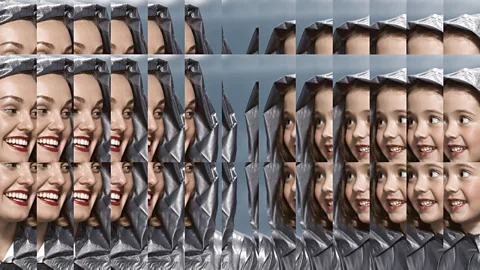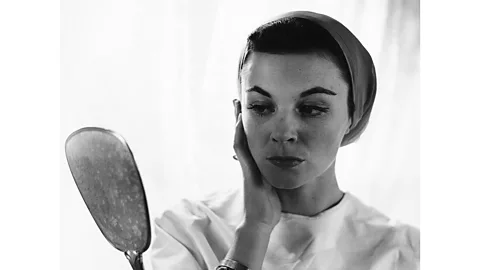Time travel: What if you met your future self?
 Edouard Taufenbach/Bastien Pourtout
Edouard Taufenbach/Bastien PourtoutImagining a conversation with "future you" has multiple benefits for your wellbeing.
There's a classic short story by Ted Chiang in which a young merchant travels years ahead and meets his future self. Over the course of the story, the man receives warnings, promises and tips from the older, wiser version of himself. These premonitions then change the course of the merchant's life until he eventually becomes an older man, who meets his younger self and imparts the same wisdom.
Scenarios like this are wildly popular and have been explored in many other novels as well as in movies like Back to the Future, and TV shows as diverse as Family Guy, Quantum Leap, and the BBC's own Doctor Who (see "The Doctor meets The Doctor" below).
For obvious reasons, these narratives have always been relegated to the realm of science fiction. But what if – and it is a big what if – you could meet your future self? What a very strange question, but one that I believe is worth asking.
I'm a psychologist and professor, so I recognise that talking about the hypothetical implications of time travel may sound strange coming from someone in my career. But my research over the last 15 years isn't all that far off from this theme. I've largely focused on how people think about and relate to their future selves, and I recently published a book on the topic. In it, I explore the reasons why we have such a hard time making long-term decisions, and how – by improving the emotional connections we have with our future selves – we can ultimately make better choices.
To mark the 60th anniversary of Doctor Who, we're exploring the big questions about time, including the science of time travel, how clocks have shaped humanity, and even the mind-bending temporal consequences of flying into a black hole. Read and watch more from Time: The Ultimate Guide.
In my research, I've learnt that we often imagine our future self as another person. That tendency can create problems for us. To get a sense of why, think about someone in your life who you barely know: a neighbour or a co-worker, for instance. If that stranger asked you to make a sacrifice for their benefit – say, to lend them money – you might politely decline. If we treat our future selves the same way, then it makes sense why we sometimes give in to short-term desires (like buying a higher-end TV or car) rather than do something we'll feel better about in the long run (saving for a vacation next summer).
If only we could try to make our future selves seem less like strangers: people like our partners, loved ones, or best friends. One way to bridge the emotional gulf is to think of future selves in more concrete and vivid ways. What's vivid is emotional, and what’s emotional can kick us into action. In one recent study, for instance, my collaborators and I partnered with a bank and found that when customers were shown age-progressed images of themselves alongside encouraging messages about saving for retirement, they were about 16% more likely to make a retirement contribution than people who solely received the encouraging messages. Other work has found that writing letters to – and then from – one's future self can similarly strengthen the connection between current and future selves.
Admittedly, showing people images of their older face, or having them engage in a hypothetical conversation, are far cries from actually meeting one's future self. But it's conceivable that far richer interactions may happen in the near future through artificial intelligence. (Read more: The A-Z of AI: 30 terms you need to understand artificial intelligence.)
What if an AI model akin to Chat-GPT or Bard could be trained on the life experiences of individual people? These models have become astonishingly smart by learning from vast datasets about how human beings communicate, and they essentially work by making predictions. If such a model incorporated things like your birthplace, educational history, personality, relationships and hobbies – and those of millions of other people too – it might be able to make a prediction about the person you will be in 10 or 20 years' time. To be clear, the model wouldn't be predicting exactly what choices you'd make. It'd be more about showing your potential, based on the lives of people similar to you: not just one possible life for you, but rather, the most possible life path for you.
The Doctor meets The Doctor
As a time traveller, it's perhaps not surprising that Doctor Who has met themselves more than once. Yet despite their wisdom and experience, they often treat each other as strangers – spending their encounters bickering, criticising their counterpart's clothing, or commenting on the redesigned Tardis. Watch: Three times The Doctor met themselves.
Now, imagine conversing with that future version of you in the same way you might chat with a friend or loved one now. What would you ask? My own knee-jerk response – and that of other people I’ve discussed it with – is often resistance. The source of this, I think, boils down to our desire to see ourselves as unique. How, we wonder, could an algorithm make a prediction about me – me with my many-coloured feathers that make me one in eight billion?
Yet I must accept – grudgingly – that I am not as unique as I like to think, and algorithms already predict my personality, desires and choices on a regular basis. Every time I listen to a personalised Spotify playlist, or love a Netflix film recommendation, a form of AI has predicted it. As these algorithms get more powerful, with greater access to data about us and other similar people, there's no reason they couldn't go beyond surface-level details like your future self's entertainment choices. They might be able to predict how the older, wiser version of you might feel about the decisions in your life.
Eight questions to ask "future you"
So, to return to my original question: if you could time-travel to meet your future self, what aspects of your life would you want to know more about? Which ones would you prefer to be shrouded in secrecy? And if you’d pass up on the meeting, why?
I've been thinking a lot about what I would do. My first instinct would be to ask my future self things like… are you happy? Are your family members happy and healthy? Is the environment safe for your grandkids and great-grandkids?
 Getty Images
Getty ImagesThe more I considered these initial questions, the more I realised just how much I was concerned with what the future holds. A very informal survey of my wife and a few friends suggests I may not be alone in this tendency.
But reflecting on it further, I realised that the most powerful questions would be ones that helped me make better choices today. With that as the goal, I might generate several queries meant to kick off a dialogue between my two selves, such as:
● What have you been most proud of and why?
● In what ways – both positive and negative – have you changed over time?
● What's something that you miss most from earlier in your life?
● What actions have you regretted?
● What actions did you not take that you regret?
● What’s a time period you'd most want to repeat?
● What things should I be paying more attention to now?
● Which things should I stress about a little less?
Imagine if you were to put these eight questions to your future self. What might you find out that would modify how you live now? It’d probably be the most important conversation of your life.
However, the truth is, you don't need to wait for time travel or advanced AI for answers that you can act on. Through my research as a psychologist, I've learnt that simply taking a bit of time to picture this meeting can help you make better choices now, closing the emotional gap between who you are today and who you'll be tomorrow. All you need is a little imagination, and the willingness to put yourself in the shoes of a person you currently treat as a stranger.
*Hal Hershfield is a professor of marketing, behavioural decision making, and psychology at UCLA’s Anderson School of Management, and the author of Your Future Self: How to Make Tomorrow Better Today, which was published in June.
--
If you liked this story, sign up for The Essential List newsletter – a handpicked selection of features, videos and can't-miss news delivered to your inbox every Friday.
